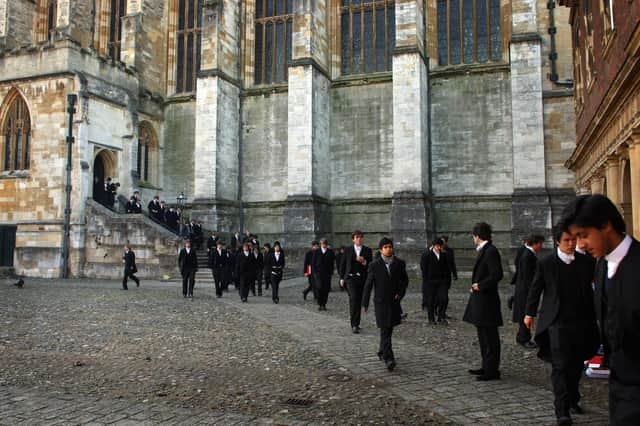Private schools: Keir Starmer's plan to put VAT on fees would backfire badly – Cameron Wyllie


That said, I’m disappointed by the lack of thinking and research that has gone into this week’s policy announcement that a Labour government will put VAT on fees paid to private schools. Disappointed, but not very surprised; this policy has been in the wind for a long time and it’s an easy way for the Labour leader to score some Brownie points with both the soft and the far-left of the party, the latter apparently feeling fairly alienated right now.
Of course, independent schools have never been an easier target; the image that the words ‘private school’ – or, indeed, ironically, ‘public school’ – brings to mind in the average British punter these days is, not unreasonably, an image of Boris or David Cameron or George Osborne or – even worse – Jacob Rees-Mogg. Actually, the very vast majority of people who attended private schools – or who currently attend them – are nothing like these men; many private school former pupils would be appalled if they thought they were being lumped in with the likes of them.
Advertisement
Hide AdAdvertisement
Hide AdThe issue of the charitable status of private schools has rumbled on for decades now. Business rates relief, part of that status, was removed in Scotland two years ago, with exceptions made for the smaller, specialist schools for vulnerable children and others with special needs which actually make up a fairly significant portion of independent schools in Scotland.
Honestly, it’s transparently clear that some independent schools entirely deserve charitable status and others don’t. I have no idea, for example, why private schools with branches abroad feeding them large wodges of cash are given charitable status: they might be a place to start.
As I have opined before, if any political party wants to end private education in this country then they must simply do that – abolish private schools. Sure, some very wealthy parents will send their kids abroad to be educated but in practice the vast majority of current private school pupils would enter state education. Of course, no mainstream political party is going to suggest that so instead they are reduced to what is, in essence, dickering about. And it’s dickering about, in this case, that will have exactly the opposite effect from that intended.
Putting VAT on school fees will have two negative consequences. The first, obvious one, is that for a certain proportion of current fee payers (estimates vary wildly), the direct addition of VAT will make it impossible for them to continue to afford fees and their children will go to the state sector. That – obviously – means an increased cost in maintaining affected state schools at their current levels of per head expenditure – about £6k a year for primary pupils and £8k for secondary students in Scotland.
My guess is that some parents would decide to save their money for secondary education and not embark on private primary schooling. However, my experience is that parents will try everything before giving up on school fees – remortgaging, taking a second job, pleading with grandparents, selling a kidney – so it might simply be that that isn’t too much of an issue in practice.
However, many private schools would try very hard not to pass on the total cost of that VAT increase. In the case of the very wealthy schools down south, that might mean sacrificing a new building. For the more mainstream private school, it will mean cutting back on financial aid, on the bursaries and scholarships which help young people from more financially constrained backgrounds go to private schools for part of the fee or for nothing.
At a stroke, with its desire to make things more equal, the Labour party would simply be making private schools more elitist, just as happened when they abandoned the direct grant in 1975 – lots of less well-off kids left private education.
In their excellent book, Engines of Privilege (subtitled ‘Britain’s Private School Problem’) the historian David Kynaston and the economist Francis Green, both gentlemen of the left, admit that, while they abhor private schools and the perceived unfairness of the whole concept of private education, this kind of chipping away is not the answer. The radical solution they advocate is to legislate to make private schools all have 30 per cent of their places allocated free, with the state paying to the schools only the amount they would be paying for each child’s state education anyway.
Advertisement
Hide AdAdvertisement
Hide AdNow, Kynaston and Green’s book does have some problems for me, not the least being its Anglocentricity, but I can see that banging on about Eton and Winchester is a lot more clear cut than talking about Manchester Grammar School or Glasgow Academy (and all the others which are, of course, the majority of private schools). But this idea – that a third of pupils attend free – seems an opportunity both to begin a levelling of the playing field (there’s an appropriate use of a cliché) and to test the whole business of charitable status.
It would certainly avoid making independent schools even more exclusively for the children of comfortably off people and positively rich people and I commend their suggested policy to Sir Keir as a more visionary, more useful and more practical way of changing the status quo.
Cameron Wyllie writes a blog called A House In Joppa. His book, Is There A Pigeon in the Room? My Life in Schools, is published by Birlinn.
Comments
Want to join the conversation? Please or to comment on this article.